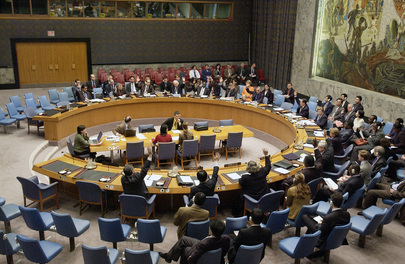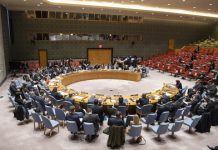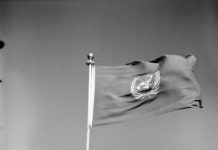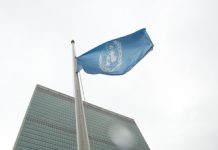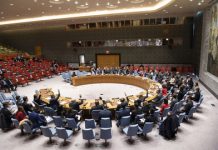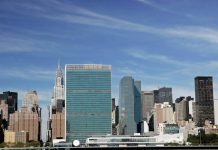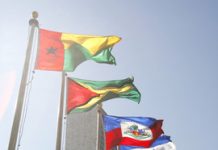This is the News in Brief from the United Nations.
More than 500 Palestinians killed in occupied West Bank: UN rights chief
Violence in the occupied West Bank linked to the war in Gaza has reached a deadly new high with more than 500 Palestinians killed since 7 October, UN human rights chief Volker Türk said on Tuesday.
Two of the latest fatalities were 16-year-old Ahmed Ashraf Hamidat and 17-year-old Mohammed Musa Al Bitar, Mr. Türk said in a statement, which noted that both were shot by Israeli Security Forces – ISF – soldiers near Aqabat Jaber refugee camp, CCTV footage showed.
With more here’s UN human rights office spokesperson Jeremy Laurence:
“Among the 505 Palestinians killed so far are two boys shot at the weekend at a distance of about 70 metres while running away after throwing stones and/or Molotov cocktails towards a military post outside a settlement near Aqabat Jaber.”
The OHCHR spokesperson added that since 7 October, 24 Israelis, including eight soldiers, have also been killed in the occupied West Bank and Israel in clashes or during alleged attacks by Palestinians from the West Bank.
In his statement, the UN High Commissioner noted that the Israeli military had carried out “at least 29 operations” in the West Bank involving airstrikes by unmanned aerial vehicles or planes. He also said that ground-to-ground missiles had been fired on refugee camps and other densely populated areas.
A total of 164 Palestinians were killed during these strikes, including 35 children, with a “prevalence” of Palestinian victims shot in the upper part of the body and denied medical assistance.
This suggests “intent to kill in violation of the right to life, rather than a graduated application of force and an attempt to de-escalate tense situations,” the High Commissioner’s statement said.
Break free from pollution, climate chaos and biodiversity decimation, urges UN chief
It’s time to break free from pollution, climate chaos and biodiversity decimation to save the vital ecosystems that we all need to live on the only planet we have.
That’s the urgent message from UN Secretary-General António Guterres for World Environment Day, which is observed on 5 June.
This year, the theme is “land restoration, desertification and drought resilience”.
All countries need to respect these three key aims, Mr. Guterres said, or else face crops failing, water sources vanishing, economies weakened and communities endangered.
And in a call to the world to act together as “Generation Restoration”, the UN chief insisted that “swift and effective action to restore degraded ecosystems makes economic sense”.
Every dollar invested creates up to $30 in benefits, Mr. Guterres said, as he called on wealthy nations – once again – to “drastically scale-up finance” to help developing countries adapt to violent weather, protect nature and support sustainable development.
Little protection for travellers even on major migration routes: UNHCR
Conflicts in Sudan and across the Sahel region have compromised protection for migrants who continue to face “unimaginable horrors” on major migration routes to Europe, UN humanitarians said on Tuesday.
A new report from the UN Refugee Agency (UNHCR) confirmed that each year, hundreds of thousands of people risk their lives to migrate from sub-Saharan countries in Africa without access to assistance, shelter or information about the dangers from traffickers.
This is even though the location of major movement hubs is well known, said Vincent Cochetel, the UN agency’s Special Envoy for the Central Mediterranean.
He said that the absence of critical services placed refugees and migrants “at great risk of harm and death” and also triggered dangerous secondary onward movements.
“Our capacity to partner directly with local authorities is missing. Yet, those local authorities are there…they are located in places where humanitarian actors cannot be present, either because of safety concern or because authorities don’t want humanitarian actors to be present. But the local authorities are there and they would be able to provide those immediate protection services.”
To remedy the situation and save lives, the UNHCR official called on donors and stakeholders to support the agency’s humanitarian work and that of local partners in targeted locations.
Daniel Johnson, UN News.
Source of original article: United Nations (news.un.org). Photo credit: UN. The content of this article does not necessarily reflect the views or opinion of Global Diaspora News (www.globaldiasporanews.com).
To submit your press release: (https://www.globaldiasporanews.com/pr).
To advertise on Global Diaspora News: (www.globaldiasporanews.com/ads).
Sign up to Global Diaspora News newsletter (https://www.globaldiasporanews.com/newsletter/) to start receiving updates and opportunities directly in your email inbox for free.


